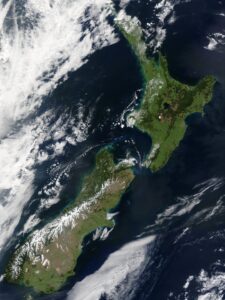 On Tuesday 22 November the New Zealand Ministry for Business, Innovation and Employment, our largest public research funder, announced a new Open Research Policy. The policy comes into effect from 1 January 2023 and requires all peer-reviewed articles and conference proceedings arising from MBIE funding to be made open access.
On Tuesday 22 November the New Zealand Ministry for Business, Innovation and Employment, our largest public research funder, announced a new Open Research Policy. The policy comes into effect from 1 January 2023 and requires all peer-reviewed articles and conference proceedings arising from MBIE funding to be made open access.
This is a hugely positive step for Aotearoa New Zealand. Up until this point, we have struggled to reach over 50% open for the publications produced by our universities alone. Research undertaken by the Council of NZ University Librarians (CONZUL) indicates that in 2021 just over 55% of publications arising from MBIE-funded projects were open. This figure could have been 75% if the policy was already in place. In the words of the Prime Minister’s Chief Science Adviser, Professor Dame Juliet Gerrard “It’s really important that all government-funded research is open to the public, who ultimately pay for it”. Giving the public access to research funded by their tax dollars isn’t only fair and the right thing to do, it also increases the impact of our research because it can be read by other researchers around the world, journalists, educators, policy-makers, practitioners, businesses, community groups, and advocates, who otherwise would hit a publisher paywall.
The new policy recognises the value of encouraging a variety of approaches to delivering open access, as it provides pathways for making work available through fully open access journals or through open access repositories, subject to publisher embargoes of up to 12 months. The latter is important because it provides researchers with a path to comply with the policy that will not require paying an open access publication fee, and makes use of existing research infrastructure to preserve and disseminate their work.
While MBIEs new policy does not include research data, it “strongly recommends…that research data arising from funded projects be made openly available whenever they are not precluded by indigenous data sovereignty considerations, copyright restrictions, confidentiality requirements, or contractual clauses.” Open access and open research data combine powerfully to unleash impact and innovation, so this marks another positive step forward.
Our friends in the Northern Hemisphere have a longer history with these kinds of mandates. The United States National Institutes of Health was one of the first government agencies to adopt a similar mandate back in 2008. The European Union and most of its member states have had similar policies in place for a decade now, covering billions of dollars in public research expenditure, and it shows in their high open access rates. Since 2018, a number of national research funders, European and international organisations and charitable foundations have signed onto Plan S, further strengthening their mandates with Rights Retention clauses. In Australia, the ARC and NHMRC have had policies in place since 2012/2013 and the NHMRC’s policy was updated in 2022 to require research publications to be immediately open with a CC BY licence in alignment with cOAlition S, which the NHMRC has now joined. Aotearoa New Zealand finally joins the list of countries with a major funder mandate.
What happens next? As the largest and most influential public funder of research, MBIE will no doubt influence other funders here to take a similar position. Meanwhile, the research community is awaiting guidance from MBIE to clarify the finer points of the policy. Universities will need to move fast to get things in place for 2023. Half of our universities already have existing institutional OA mandates but the others will need to adapt quickly. It will be vital to support university library and repository staff to operationalise the policy. Researchers will need to be brought up to speed on publishing terminology and the effects of their publishing choices on accessibility of their work. CONZUL is working on a project plan to develop training for academics and is encouraging its own members to upskill so they are ready to play their part.
Implementing the policy will not be without its challenges. But, it is a move that we, the authors, fully support. It will advance the open research kaupapa, emphasise the value of institutional repositories, and help to shift the way open access is approached in Aotearoa New Zealand. It provides a robust foundation for an open research agenda which should aim to view the partnership between researchers and communities through a Tiriti lens, centre Aotearoa’s unique Mātauranga Māori, and unlock the potential of publicly-funded research. We now have the incentive to grow our own open infrastructure to describe, disseminate, and preserve our research heritage in a way that makes sense for our local values and aspirations.
MBIE has taken the first step on this important journey, but we need our other research funders to join them to deliver a courageous vision of Open Research for Aotearoa.
Thomas E. Saunders
The University of Auckland
https://orcid.org/0000-0003-1780-0314
Richard White
University of Otago
https://orcid.org/0000-0002-8975-3126
Jess Howie
University of Waikato
https://orcid.org/0000-0002-3164-5034
Luqman Hayes
Auckland University of Technology
https://orcid.org/0000-0003-1407-429X
Michelle Blake
University of Waikato
https://orcid.org/0000-0002-3647-9848
Kim Tairi
Auckland University of Technology
https://orcid.org/0000-0003-2580-5756